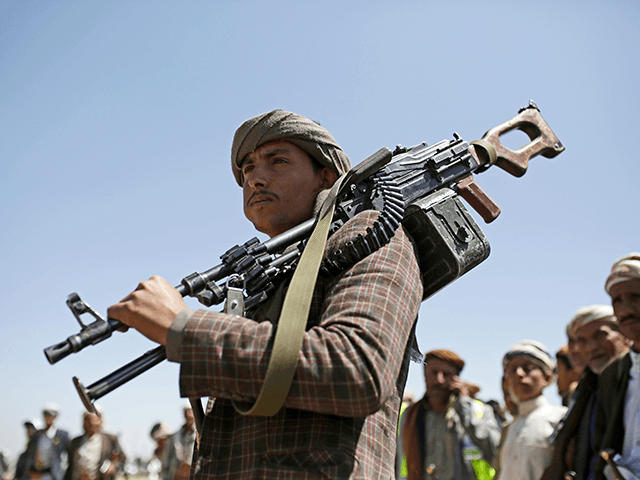The Houthis, Yemen’s Iran-backed Islamist terrorist insurgency, attacked civilian and military sites in Saudi Arabia on Thursday with 18 armed drones.
The Saudi-led military coalition fighting to restore the legitimate government of Yemen said it was able to intercept most of the drones, although some damage was reported at a petroleum distribution station in the city of Jazan.
A Houthi spokesman claimed facilities in four cities belonging to Saudi Aramco, the Saudi state oil company, were targeted with drone attacks along with several Saudi military bases.
Houthi-controlled media said 18 bomb-carrying drones and eight missiles were launched in the attacks. Saudi media said universities in the cities of Jazan and Najran were among the targets of the Houthi attack, but the drones launched at both schools were intercepted.
“We are prepared to carry out stronger and harsher military attacks in the coming period,” the Houthi spokesman said.
“These attacks confirm the terrorist Houthi militia’s rejection of all political efforts to end the crisis,” responded Saudi Defense Ministry spokesman Col Turki al-Malki.
The Saudis allowed fuel carriers to dock at Yemen’s port of Hodeidah and offered a ceasefire proposal this week, but the Houthis ignored the offer and blamed the Saudis for prolonging the humanitarian crisis in Yemen by blockading its ports.
The Biden administration, which acted quickly to remove the Houthis’ designation as terrorists, issued its latest statement of concern about all the terrorism the Yemeni insurgents have been perpetrating:
The United States again joins the international community in strongly condemning the attacks against Saudi Arabia that struck an oil facility in Jizan. The attack comes days after the Kingdom of Saudi Arabia and the Republic of Yemen announced a commitment to reach a ceasefire and engage in UN-led peace talks.
The actions by the Houthis are a clear provocation meant to perpetuate the conflict. This is the latest in a series of Houthi attempts to disrupt global energy supplies and threatens civilian populations. The Houthis’ actions are prolonging the suffering of the Yemeni people and jeopardizing peace efforts at a critical moment when the international community is increasingly united behind a ceasefire and a resolution of the conflict.
The U.S. special envoy to Yemen, Martin Griffiths, met with a senior Houthi official in Oman on Friday and urged the insurgents to negotiate a ceasefire. Griffiths said he discussed the Houthis’ demands for an end to the Saudi blockade and suggested the airport in Yemen’s Houthi-controlled capital, Sanaa, could be reopened as part of a ceasefire deal.
Former U.N. special envoy Jamal Benomar wrote at the UK Guardian on Friday the Houthis are unlikely to settle for anything less than a “power-sharing settlement” that secures their control over much of Yemen. The Houthis are clearly uninterested in making any concessions to obtain a ceasefire and remain adamant that their own demands must be met before negotiations for a political conclusion to the long-running Yemeni civil war can begin.
“If the U.S. makes clear to the Houthis and the southerners in Yemen that a settlement containing a fair solution that embraces their concerns is on the table, there is a chance for peace. It must put power-sharing at its core. This may not be ideal, but the alternative is war,” Benomar wrote, referring to the southern Yemeni separatists who are uneasily allied with the government and Saudi coalition against the Houthis.
Doha Institute associate professor Ibrahim Fraihat told Al Jazeera News on Friday the Houthis are stepping up attacks to strengthen their hand for negotiations, and also to help their patrons in Iran put pressure on the U.S. and its allies in the region.
“This is important for the Houthis because the way they see it is if they escalate and gain power on the ground, this significantly improves their negotiating position,” said Fraihat. “In addition to this, there is also the regional dimension, we are seeing a stalemate in negotiations on the nuclear deal with Iran and Iran is trying to escalate on this side because Tehran is demanding that the U.S. lift the sanctions.”

COMMENTS
Please let us know if you're having issues with commenting.